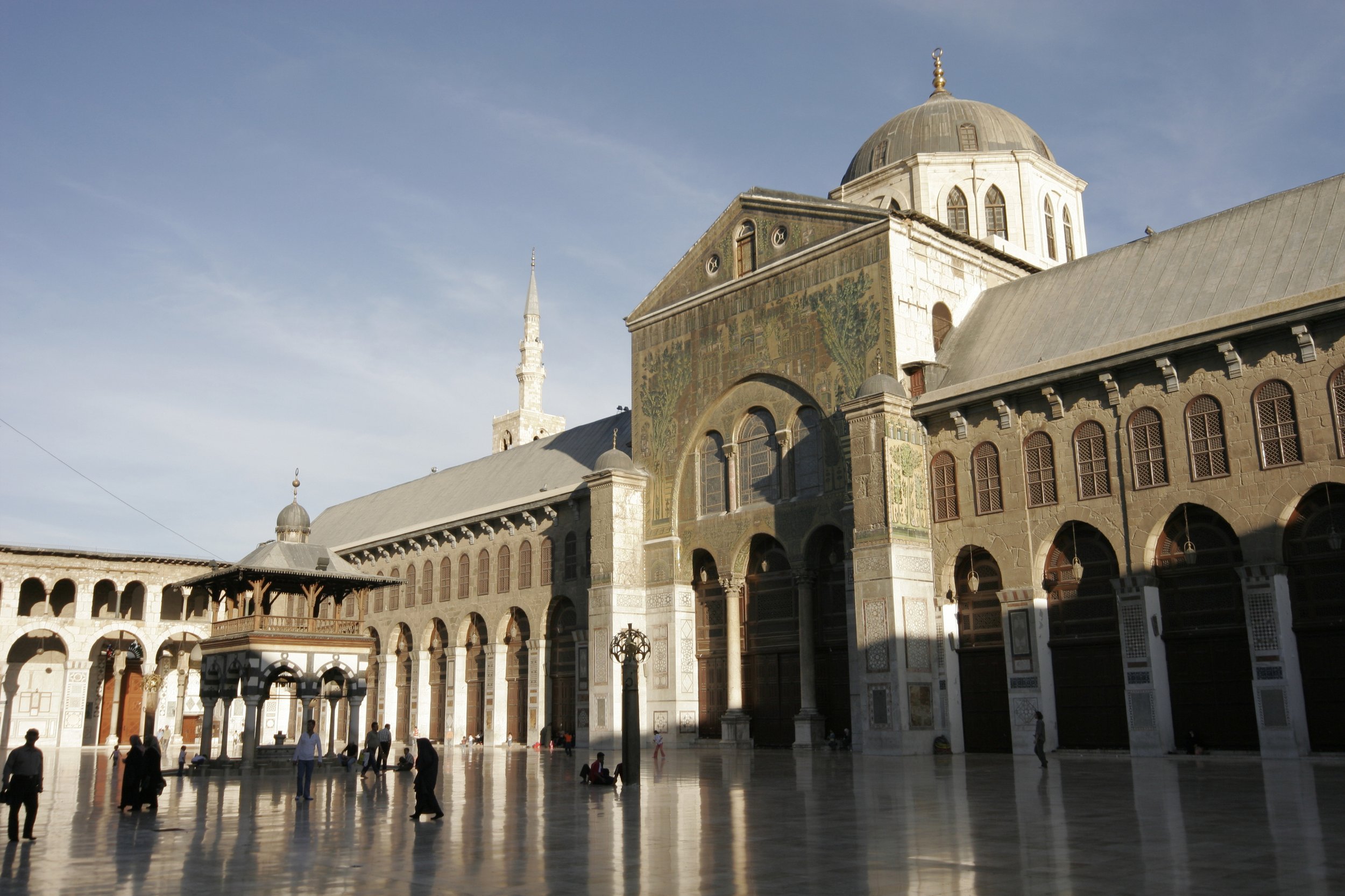This biography is adapted from the introduction of IGI’s new translation of The 40 Hadith of Imam al-Nawawi, published in 2022.
Al-Nawawi is the Imam, the unique hafiz and exemplar, the Sheikh of Islam, the emblem of the saints, Muhyi al-Din Abu Zakariyyah Yahya ibn Sharaf ibn Murri al-Huzami al-Harani al-Shafi’i. He is the author of many beneficial works.
His Life
Imam al-Nawawi was born in the month of Muharram in the year 631 AH (October 1233 CE) and moved to Damascus in the year 649 AH (1251-1252 CE). There, he stayed in the madrasah ‘al-Rawahiyah’ living off of bread. He memorized al-Tanbih in four and a half months and spent the rest of the year studying and memorizing a quarter of al-Muhadhdhab with his sheikh, al-Kamal ibn Ahmad. After that, he performed hajj with his father and stayed in Madinah a month and a half. However, he was sick the majority of the trip.
Our Sheikh, Abu al-Hasan ibn ‘Attar stated that Sheikh Muhyi al-Din mentioned to him that. in the beginning of his studies, he would sit and take eleven lessons a day with his sheikhs: two lessons on al-Wasiṭ, one on al-Muhadhdhab, one on al-Jam’bayn al-Sahihayn, one on Muslim’s Sahih, one on al-Luma’ of Ibn Jinni, one on logic, one on Arabic morphology, one on the principles of jurisprudence, one on Hadith narrators, and one on the fundamentals of the religion (theology).
He, al-Nawawi, said:
“I would write down anything they mentioned related to the explanation of problematic words or expressions and correction of the texts and of expressions. Thus, Allah (Exalted is He) blessed me in my time. Then, the thought occurred to me to busy myself with the science of medicine. So I would busy myself with the book al-Qanun. However, my heart became dark, and I spent days without being able to dedicate any time to it. So [I] had pity on myself and sold al-Qanun and my heart became, again, illuminated.”
The ‘Umayyad Mosque in Damascus, the city where where Imam al-Nawawi resided for most of his career
His Teachers
Among his teachers are:
Al-Riḍa ibn al-Burhan
The Sheikh of sheikhs, ‘Abd al-’Aziz ibn Muhammad al-Ansari
Zayn al-Din ibn ‘Abd al-Da’im
Imad al-Dan ‘Abd al-Karim al-Harastani
Zayn al-Din Khalid ibn Yusuf
Taqi al-Din ibn Abi al-Yusr
Jamal al-Din ibn al-Sirfi
Shams al-Din ibn Abi ‘Umar
He studied many texts with them, such as the Six Books, al-Musnad of Imam Aḥmad, al-Muwaṭṭa’ of Imam Mālik, Sharḥ al-Sunnah of al-Baghawi, and Sunan al-Daraqutni.
He also studied al-Kamal by Hafiz ‘Abd al-Ghani ʿAlā’ al-Dīn and the Sharḥ of the Hadiths of the two Sahihs with muhaddith Abu Ishaq Ibrahim ibn ‘Isa al-Maradi. He studied usul with al-Qadi al-Taflisi. And he studied fiqh with al-Kamal Ishaq al-Maghribi, Shams al-Din ‘Abd al-Rahman ibn Nuh, ʿIzz al-Din ʿUmar ibn Asʿad al-Irbili, and al-Kamal Sallar al-Irbili. He studied Arabic grammar with Sheikh Ahmad al-Misri and others. He studied with Ibn Malik one of the books that the latter authored.
He always kept himself busy writing, spreading knowledge, worshiping, performing litanies, fasting, reciting the Qur’an, and being patient with an austere life in terms of food and dress. He would only wear a plain robe and his turban of sheikh-hood, which was small.
His Students
He supervised the education of a number of Scholars. Among them are:
Al-Khatib Sadr al-Din Sulaymin al-Ja’fari
Shihab al-Din al-Baytar
Shihab al-Din al-Arbadi
Abu al-Fath, al-Muzzi, and Ibn al-’Attar all narrated from him.
A caravanserai in the Old CIty of Damascus
His Struggle, Faithfulness and Asceticism
Ibn al-’Attar said,
“Our sheikh (may Allah have mercy upon him) mentioned to me that he would not waste any time of the day or of the night, not even while traveling. He perpetuated in that state for six years. Then he began to write, teach, counsel people, and speak the truth.
“I say, despite his struggle against his soul, he acted upon the finer points of caution, was vigilant, purified his soul of evil inclinations, and destroyed its ulterior motives.
“He would also memorize hadiths with the issues to which they pertained and their narrators, of which were sahih and of which were defective. Furthermore, he was the leading scholar in knowledge of the (Shāfiʿī) madhhab.”
A biography of Imam al-Nawawi given by Shaykh Sjaad Hussain
Our Sheikh, Rashīd ibn al-Muʿallim said:
“I expressed dislike for Muḥyī al-Dīn’s [habit of] never entering the bathroom and the paucity of his living standards in terms of his food, clothing, and situations. I further cautioned him that he may become sick with an illness that will prevent him from his duties.
“He responded, ‘So and so fasted and worshiped Allah until his skin became pale.’
“He would also refuse to eat fruits and pleasant foods saying, ‘I fear that my body will become moist and I will become sleepy.’
“He used to eat a single meal per day, and he would only drink one beverage in the pre-dawn hours.”
Ibn al-’Attar said:
IGI’s edition of The 40 Hadith of Imam al-Nawawi was published in 2022.
“Regarding his statement on fruit, Damascus has a lot of orchards that are of public trust or part of privately-owned property. Selling [of their produce] is the right of the owners or of those who harvest and package it for them and then sell it, like sharecropping. However, that (sharecropping) is differed over. So, how can anyone willingly eat such produce?”
His Works
Among his works are:
Al-Taqrīb
Al-Mubhamat
Al-ʿUmdah fī Tashih al-Tanbih
Al-Idah fī al-Manasik
Al-Tibyan fī Adab Hamalat al-Qur’an
A partial commentary on al-Muhadhdhab
A partial commentary on al-Bukhari
A partial commentary on al-Wasit
The ‘Umayyad Mosque in Damascus
His Thoroughness
He would rarely accept anything from anyone. And he would only do so from those with whom he had no working relationship. A poor person gifted him a pitcher and he accepted it.
Sheikh Burhan al-Dīn al-Iskandarani insisted that he eat breakfast in his presence. He said, ‘Bring the food here and we will all eat from it.’ So he ate from that, though it was two kinds of food.
And the Sheikh would sometimes eat two sauces together [in one meal].
His Position of Commanding the Kings to Good
He would address the kings and tyrants with repudiation, attempting to instil fear of Allah (Exalted is He) in them through his letters. He once wrote:
From the slave of Allah, Yahya al-Nawawi. May the peace, mercy and blessings of Allah be upon the good ruler, King of the rulers, Badr al-Din, may Allah perpetuate upon him blessings, grant him many good deeds, and cause him to reach all of his hopes from the good of this world and the Hereafter. And may He bless him in all of his states. Amin. Let it arrive to your noble knowledge that the people of Shām are in a straitened and weakened circumstance due to scarcity of rain.
He then detailed the situation. In the contents of that letter, he included a specific, scathing, repudiatory response to King al-Zahir, such that the gathering was disturbed. He wrote a number of letters to King al-Zahir commanding him to do good.
Sheikh Ibn Farah was once explaining what a sheikh of Hadith is, when he suddenly said,
“Sheikh Muhyi al-Din obtained three distinctions, which, if a person possesses one of them, people should travel to learn from them: knowledge, asceticism, and commanding the good and forbidding the evil.”
The grave of Imam al-Nawawi is well known, and has a tree growing from it, which survived a bombing in recent years.
His Passing
The Sheikh travelled and visited al-Aqsa Mosque (Bayt al-Maqdis). Then he returned to Nawa, Syria. He became ill while visiting his father. His illness increased and he departed towards the mercy of Allah on the twenty-fourth of Rajab in the year 676 AH (December 21, 1277 CE). His grave is known and visited as was reported by Sheikh Quṭb al-Din al-Yunayni, who then said,
“He was the most unique of his time in knowledge, asceticism, worship, and austerity. He opposed King al-Ẓāhir on more than one occasion on account of justice. And it is narrated that King al-Ẓāhir said, ‘I fear him.’ He was the head sheikh of Dār al-Hadith.’ I say he became its head in the year 665 AH (1266-167 CE), after Abū Shammah. He remained its head until he passed away (may Allah sanctify his secret).”
IGI Patreon members get early access to translations, original works, and excerpts like this one.
Known in Arabic simply as the Arba'in, "The Forty," The Forty Hadith of Imam al-Nawawi is without question the most widely-known and widely-read small compilation of Prophetic hadith.







